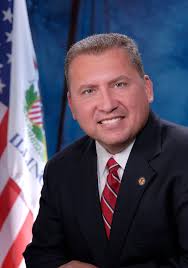When I started this blog series two weeks ago, I thought it might be a good idea to invite a few of my local elected officials (as well as former policy-makers) to weigh-in on the subject. Unfortunately, everyone has either declined or not responded except for Michael Noland, who is my state senator. I want to thank Senator Noland for taking the time to be thoughtful and responsive. (A copy of the senator’s guest blog can be found in the space below.)
For those of you who are coming to the party a little late, here is a quick summary. In Part 1 of this series, I shared survey results provided by United Way of Illinois along with other insights and perspectives . In Part 2, I talked to a non-profit executive director whose organization lost significant funding as a result of Illinois’ budget impasse and shared some surprising developments. In Part 3, I offered a few suggestions for Illinois non-profit leaders on how to tackle this issue inside their organizations as the crisis deepens.
I hope this four part series on the Illinois budget impasse and its effect on non-profit organizations has been information and engaging. Please share your thoughts in the comment box below. Here’s to your health! ~Erik

In February of 2015, the governor proposed his first budget to the General Assembly, a budget that would make harsh cuts to important services in our state. His message was a call to cut waste where at all possible. In 2015, I was hopeful that we would be able to work with the Governor to establish both a source of revenue and make responsible cuts to balance the state budget.
The Governor also submitted for the General Assembly’s approval what he referred to as his “Turnaround Agenda”. The agenda was one that called for creating Right to Work Zones; an end to collective bargaining for teachers and state workers; reduced funding for education and health care and tax breaks for large corporations and the wealthy; all, clear non-starters for Democrats.
A year has passed and it has become clear to me that the Governor wants nothing more than to continue his standoff to push a “turnaround agenda” that is harmful to the people of Illinois and specifically to the working-class families I swore to represent. And so, since June 1st 2015 Illinois has operated without a budget.
Over this time I have received numerus emails from citizens, heads of social service organizations, small business owners and others over the lack of a state budget and I continue to share in the anxiety and hardships that this places on my constituents and on our state. The result of this delay and uncertainty over the funding for our vital programs and services in Illinois is an inexcusable disaster that I do not go a single day without standing at the ready to negotiate a solution with the Governor and Republicans in the General Assembly.
The truth is, in Springfield, in the senate, we have passed numerous budget proposals since June 1st in attempts to address the budget impasse. The senate has fought for a budget for K-12, worked to secure the appropriation of federal funds, battled for funding for the Monetary Award Program to support our college students, attempted to grant funding to human services programs not covered by consent decrees and more. Most recently, the senate approved SB2059, which would appropriate 3.8 billion dollars in funds to various agencies, including social service programs and higher education. The fact remains that the Governor is simply unwilling to negotiate a budget that does not include multiple aspects of his harmful agenda.
Through all these legislative proposals the public must understand something very important that is often forgotten: the General Assembly does not have the power to distribute these funds. All we can do is grant the Governor the ability to do so. The Governor, as chief executive, directs staff to write the checks we have allowed him to write. This budget impasse is shaped by two main causes. The first and foremost is the Governor’s unwillingness to compromise and listen to the angry voices coming to him with legitimate concerns and crises. These angry voices, our social services, colleges and universities and health care providers are asking to be paid for their services and the Governor, quite simply, refuses to write the checks for the money the state owes them.
However, the Governor is right about something that is impossible not to acknowledge. We have a lack of revenue in Illinois. Elected officials that ignore this are simply kicking the can down the road, something I personally refuse to do. There are social service programs that simply cannot be cut, there are educational services and public safety programs that need more funding and to do this the state requires more revenue. There is ample evidence that we, as a state, are more than capable of providing that revenue. This is a discussion that needs to be happening in Springfield now and not later when the state is in even greater crisis than it already is. As we now return for the second half of the spring session in the Illinois General Assembly, I look forward to working with members on both sides of the aisle to craft a state budget that meets the just demands of the good people we are sworn to represent.
Sincerely, State Senator Michael Noland (D-22nd)
![]()
